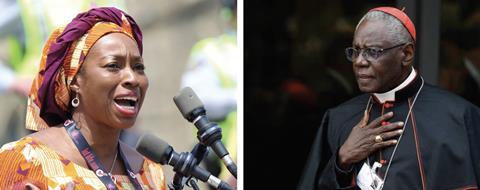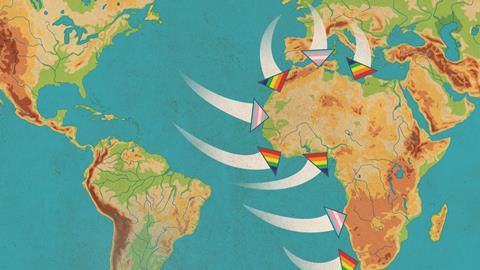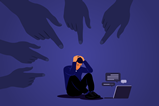Christian leaders in the UK have spoken of making amends for Britain’s colonial past, yet many Africans say that when it comes to sexuality, the West is still imposing its beliefs on them today. Heather Tomlinson explores the widening international chasm on sexual ethics
Most Rev Justin Welby has done an awful lot of apologising while Archbishop of Canterbury. He has prostrated himself in front of a memorial of the Amritsar massacre in India and apologised for the Church of England’s “grevious sins” against the Indigenous peoples of Canada. Many agree with his fervour: a recent report from the Oversight Group of the Church Commissioners recommended that the Church of England should also apologise for “seeking to destroy diverse African traditional religious belief systems”.
This suggests that changing the beliefs of the majority world has become so controversial that the value of sharing the gospel itself is in question – even though the African continent was one of the first homes of the Christian faith in its earliest days. “What on earth must African Anglicans think about this?” commented Dr Ian Paul, a conservative evangelical, on his blog. “The gospel, for which they are so grateful, and which they continue to share with great courage in the face of militant Islam, is something the CofE regrets sharing with them?”
Given the sensitive context, it might be expected that the African Church would now be better listened to, and Westerners would be especially careful not to impose their values on them. So it is puzzling to hear the exact opposite. Africans say Western ideologues are still imposing their beliefs – today, in the here and now.
LGBT rights are now so widely accepted in the West that it’s easy to forget how different other cultures are
LGBT rights are now so widely accepted in the West that it’s easy to forget how different other cultures are. Acceptance of homosexuality varies between different African countries but, on average, just 21 per cent are tolerant of same-sex relationships, according to the pan-African research network, Afrobarometer. A recent survey by Pew Research Center found that even in the most accepting of countries on the continent, South Africa, only 38 per cent of the population approved of same-sex marriage. In Nigeria and Kenya, who had the lowest rates, this fell to just two and nine per cent respectively.
Recently, these beliefs have been expressed through much tougher laws, which go way beyond what most British Christians could affirm – even those who believe that homosexual acts are sinful. In Uganda, tougher prison sentences for gay sexual activity were introduced in 2023, and even the death penalty in certain cases, such as rape or repeat convictions. Now, even ‘promoting’ homosexuality can lead to a custodial sentence. These measures did not come from fringe extremists in the country: they had widespread support. In Ghana, a law was passed that allows a prison sentence of up to three years for anyone who even identifies as LGBT.
Pressure from the West
As a result of these moves, some Western governments have taken punitive action. US president, Joe Biden, described the Ugandan laws as a “tragic violation of universal human rights” and announced sanctions, while the World Bank refused new loans to the country. In response, Uganda’s minister for foreign affairs, Henry Oryem Okello, pointed out that many Middle Eastern countries have harsher laws. “Why pick on Uganda?” he asked. In Ghana, the president delayed his approval of its recent bill, following a warning that World Bank funding could be restricted as a result.
Western churches have also been critical of these moves, even conservative groups such as Living Out, which promotes celibacy for same-sex attracted Christians. “Treating people with dignity and respect is the way to lead people to faith and obedience to Jesus”, said Rev Sean Doherty, principal of Trinity College Bristol, in an opinion piece for Premier Christianity. “Treating people as criminals is far more likely to drive them away.”
Western coercion – regarding homosexuality, but also sex before marriage, abortion, contraception and other modern values drawn from the sexual revolution – remind many Africans of the unhappy history of our relationship. “There is a new colonialism in our time – not of lands or of natural resources but of the heart, mind, and soul of Africa”, writes pro-life activist Obianuju Ekeocha in Target Africa: Ideological neocolonialism in the twenty-first century (Ignatius Press).
“The Western superpowers have rejected sexual differentiation and complementarity, heterosexual marriage, and the traditional family as the cornerstone of their societies. Their embrace of sexual confusion and aberration has caused a chasm between them and Africa, between their culture and ours.
“In the clashes that have resulted, many Western leaders have revealed themselves to be modern colonial masters, threatening to withdraw aid from countries such as Nigeria and Uganda unless they accept their global sexual agenda.”
It is notable that many of these voices are positive about the influence of Christian faith on their homelands and distinguish it from abusive colonialism. In his book God or Nothing: A conversation on faith (Ignatius Press), Cardinal Robert Sarah spoke movingly of the humble compassion of monks who lived in his remote farming village in Northern Guinea, who gently taught their faith to the villagers, eventually encouraging the young African to become a priest himself. But he had stern words for modern Western attempts to force liberal sexual ethics onto Africa: “These policies are all the more hideous because most African populations are defenceless, at the mercy of fanatical Western ideologues”, the book reads. “The poor are asking for a little aid, and some people are cruel enough to poison their minds. Africa and Asia absolutely must protect their cultures and their own values.”

Church divides
Many churches in the majority world strongly disagree with the inclusive direction many Western denominations are moving in. The long-running dispute within the Anglican Communion over sexuality was sparked by the appointment of two openly gay bishops in 2003: Gene Robinson in the US Episcopal Church and Jeffrey John in the Church of England. Its more conservative members criticised such moves and have long threatened to split as a result, leading to the creation of GAFCON and Global South Fellowship of Anglican Churches (GSFA). Since the CofE approved same-sex blessings in 2023, this separation widened, with both organisations rejecting Archbishop Justin’s authority. Perhaps it is telling that Welby himself seems to agree with demoting himself, but on the basis of race: the Communion doesn’t need to be run by “a white guy from England”, he told a conference in 2023.
Communion relationships deteriorated when Welby spoke out against laws that criminalise homosexuality in Ghana in 2021, although he later apologised for not discussing his concerns with the country’s bishops first. He also criticised Ugandan laws last year, saying he was not “imposing Western values”, but wanted to remind them “of the commitments we have made as Anglicans to treat every person with the care and respect they deserve as children of God”.
His input was not well received. “It is pertinent to remind Archbishop Welby that Africa is no longer a colony of the ‘British Empire,’” said Most Rev Dr Laurent Mbanda, chair of GAFCON, in a statement in June 2023, adding that Welby should “stop meddling”.
“It seems the history of colonisation and patronising behaviour of some provinces in the Northern Hemisphere towards the South, and Africa in particular, is not yet at an end”, he added.
In late 2022, Most Rev Justin Badi, Archbishop of South Sudan, told a conference: “For too long the Anglican Communion has been driven by the views of the West. We often feel that our voice is not listened to, or respected.”
A similar divide was exposed in the Catholic Church when it published a controversial doctrinal statement in 2023, interpreted by some to say that same-sex relationships could be blessed, although its meaning was hotly debated. In the West reception varied, but African bishops were unanimous. “The African continent perceived Fiducia Supplicans as cultural colonization”, Cardinal Fridolin Ambongo Besungu, Archbishop of Kinshasa, in the Democratic Republic of Congo, told local media. The document was “a kind of Western imperialism, but on a cultural level” and imposes “practices that are considered normal in the West on other peoples”, he added. Pope Francis’ comments on the sinfulness of criminalisation of homosexuality were also unpopular.
Liberal prejudice?
Critics have questioned why the West feels emboldened to dismiss the opinion of African churches when, on most measures, they are thriving and Western churches are failing. Africans can observe the many woes of our societies via the internet: the decline of the family, the bitter divisions related to the sexual revolution and the rejection of Christian belief, for example. We are hardly an advert for more liberal attitudes, whatever the rights and wrongs of those beliefs.
Critics have questioned why the West feels emboldened to dismiss the opinion of African churches when they are thriving and Western churches are failing
Even Western LGBT campaigners are concerned about our attitudes. “Western media tend to depict ‘African homophobia’ in rather sensationalist ways – although I do wonder whether it has something to do with the deep-rooted perception of Africa as ‘backward’ that allows the West to see itself as ‘progressive’ and ‘modern’,” wrote Adriaan van Klinken, a professor of religion and African studies at the University of Leeds, in a blog published by the London School of Economics (LSE).
African diversity
However, despite the population surveys, some believe that it is a mistake to see African Christian opinion as uniformly conservative. “Africa is very much not just one place – it is immensely diverse,” Dr Phil Groves, an Anglican priest who taught theology in Tanzania for six years and is supportive of LGBT rights in Africa, told Premier Christianity. “The Anglican Church is unique in every place. It is not a whole. It is very divided.”
Some conservative Africans are also more measured. For example, Catholic writer Mathew Otieno criticised a court for upholding the use of “degrading” anal tests in Kenya, where consensual homosexual acts can lead to prison: “The African view of homosexuality, while healthy and correct in most cases, tends from time to time to be tainted by extremism,” he wrote on The Stream. “When reason collapses, it gives way to irrational and unjust hatred.”
There are liberal African voices that support LGBT rights without reservation, such as the late South African Archbishop, Most Rev Desmond Tutu. His daughter, Rev Mpho Tutu van Furth, lost her licence to practise as an Anglican priest in South Africa when she entered into a same-sex marriage in 2015.
African immigrants to the West have been inspired by the gay rights movement here, including in our churches. “For the first time I prayed knowing that God is there, that I am not a second-class Christian,” wrote Adélard Kananira, of his experience attending a Young LGBT Christians group in Italy. “My plan is to export these initiatives also to Africa, gathering a community of gay immigrants and foreigners in Italy and abroad.” He started Gay Christian Africa, a group that promotes dialogue and the experience of LGBT Christians.
In fact, Professor van Klinken argues that the promotion of LGBT rights within African countries can be inspired or encouraged by expressions of Christianity. “For many LGBT Kenyans, Christian faith remains an important source of identity and practice, despite the negative experiences they often have in church,” he said in his LSE blog. He also pointed to the creation of a LGBT-affirming church in Nairobi.
Yet Africans who hold more liberal views tend to be given accolades in the West but are often derided in their home countries. Bishop Christopher Senyonjo was defrocked in 2001 by the Anglican Church in Uganda when he began to support the LGBT community there, but was awarded an honorary doctorate in 2018 by the University of Leeds for “outstanding work as clergyman and LGBT human rights defender”. He was named one of the “ten most influential people in religion in 2010” by the Huffington Post.
This bolsters the perception that the African LGBT rights movement is inspired by the West, which may actually harm their cause. Bishop Senyonjo acknowledged this when receiving his doctorate: “There is an expressed fear that LGBT identities have been imported from Western communities to distort families and reduce African populations,” he said. “Politicians use the topic for their own political purposes, mobilising voters behind an agenda of ‘resisting Western pressure’ and ‘defending African cultural values’, which speaks to many people’s postcolonial sensitivities.”
For example, Foreign Secretary David Cameron’s threat to cut aid to Ghana over the issue was “one of the worst things to happen to gay rights” in that country, according to one insider.
Professor van Klinken defends the promotion of LGBT rights even against majority African beliefs – because he believes it is the right thing to do. “We are talking here about the rights of an often marginalised and vulnerable community,” he told Premier Christianity. “In a healthy democratic society, minority rights shouldn’t simply be defined by the preference of the majority.”
In the postmodern West, it is often said that ‘truth’ has become relative – yet there are certain subjects where clear moral lines are drawn and imposing those values is deemed acceptable. It is just the nature of the morals we wish to impose that has radically changed. Where once it was Christianity – to the apparent embarrassment of some – it is now the liberation of sex. It is perhaps not surprising that the subject is now so controversial in Africa and there is so much confusion in the West about what we do actually believe.







































2 Readers' comments